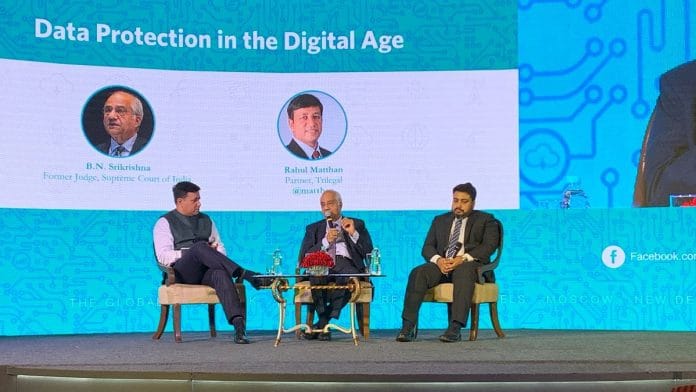New Delhi: Social media giant Facebook has indicated its apprehensions about a proposed government mandate for data access, saying it is unsure how useful its data will be.
The Data Protection Bill recently approved by the Narendra Modi cabinet has been altered to ask companies to provide to the government ‘non-personal’ anonymised data for purposes like policy making and improving delivery of public services.
At a closed-door media briefing on 4 December, the information technology ministry highlighted some key changes to the cabinet-approved Data Protection Bill, which are absent in the version published in July 2018. One such change was this requirement to share data with the government.
However, speaking on the third and final day of Carnegie India’s Global Technology Summit 2019 in Bengaluru Friday, Bhairav Acharya, public policy manager at Facebook, said if the aim “is to serve large national aims, and social good aims in the realm of healthcare and financial inclusion, then data a company like Facebook holds… Of course, it’s useful, but I don’t think the utility is large”.
Justice (retd) B.N. Srikrishna, who chaired the committee that drafted the bill, was also present on the panel with Acharya. But he largely refused to address the reported changes in the bill, labelling them “rumours”. He advised people to “wait till Monday morning”, when the bill is expected to be introduced in Parliament, and then have a debate.
Also read: Facebook has made mistakes, but is trying to regain public trust: India chief Ajit Mohan
‘Likes’ won’t help public transport planning
Acharya said the data held by social media companies is not very useful for economic activity. “Social media companies, surprisingly, don’t actually use a lot of very high quality data that is necessary for economic activity,” he said.
The statement seems in dissonance with how Facebook’s main revenue generating is done through data it holds.
Acharya then clarified: “A history of my ‘likes’ points to certain behaviour, and can be monetised, and that’s core of the businesses model. But if I want to plan public transport, forestry or a national plan of some sort, there’s very little data a social media company holds that a government might want.”
He added that it is not appropriate to mandate access to non-personal data under the Data Protection Bill, since it applies only to personal data and not to anonymised, non-personal data.
If there’s an issue “of the state or industry wanting to use non-personal data, then it’s not a privacy issue at all. It is not within the ambit of this bill”, Acharya said.
In addition to the Data Protection Authority proposed by the bill to oversee personal data-related matters, he added, “a different regulator” would be needed to oversee non-personal data.
ThePrint is a digital partner for Carnegie India’s Global Technology Summit 2019.
(Edited by Shreyas Sharma)
Also read: ‘Data nationalism’ needed to combat misuse by tech firms, hostile countries: Mohandas Pai







One example like this reveals why ruling govt in all countries begin to suck after some years. There is always a cause.Guess the faled state like Pakistan goes to second ranking and terrorism tops the enemy list even in India.